|
|
|
Sort Order |
|
|
|
Items / Page
|
|
|
|
|
|
|
| Srl | Item |
| 1 |
ID:
086616
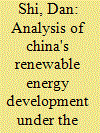

|
|
|
|
|
| Publication |
2009.
|
| Summary/Abstract |
At present, the development of renewable energy relies mainly on government support. The government invests in a considerable number of projects to improve public welfare and to assist in poverty relief. If China is to replace fossil fuels on a large scale with renewable energy sources, the production costs and prices of renewable energy must be brought down. All countries are facing the challenge of moving to a more secure and low-carbon energy system without weakening economic and social development. In this regard, China is facing an even greater challenge in terms of economic cost, as cheap coal remains the main energy form. Technical innovation and industrialization in the area of renewable energy is an important means of lowering cost. China is in for a period of high-speed development of its economy and the rising demand for energy is irreversible. If the technical progress and development speed of renewable energy lags behind the growth in demand, it will be difficult to realize the improvement of its energy structure.
|
|
|
|
|
|
|
|
|
|
|
|
|
|
|
|
| 2 |
ID:
127778
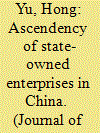

|
|
|
|
|
| Publication |
2014.
|
| Summary/Abstract |
The state sector still plays an important role in China's economy. One of the key development phenomena characterizing the Chinese economy is the rapid ascendency of state-owned enterprises (SOEs) and the resurgence of the state. The strength of China's SOEs is projected in the centrally administrated state-owned enterprises (CSOEs). They are the backbone of the national economy, spearheading national economic development and Beijing's 'going-out' strategy. The CSOEs have expanded their reach and increased their power, domestically and globally. In seeking to boost local GDP growth, the eastern provinces in China have joined the western provinces in a fierce contest to attract investment from SOEs. Nevertheless, the rapid ascendency of the SOEs has brought many negative consequences for China's economic, social and political development by causing conflict with the market-oriented development direction of Chinese economic reform and hindering fair competition between state-owned and non-state-owned enterprises.
|
|
|
|
|
|
|
|
|
|
|
|
|
|
|
|
| 3 |
ID:
118140
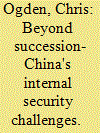

|
|
|
|
|
| Publication |
2013.
|
| Summary/Abstract |
China is undergoing a transitional period of rapid economic and social development. The way in which this period is managed will hold significant implications for the Chinese state concerning both its internal and external security. While fundamentally resting upon progressing from a developing to a developed economy, this transition highlights deep issues and tensions affecting China-ranging from rising societal inequalities to various separatism threats to mounting individualism. Regardless of internal succession struggles within the Communist Party of China (CCP), it is critical to focus upon this multitude of (mounting) social and economic issues-particularly outside of the political realm-that China's new leaders will have to face. Here, we highlight three themes central to this transition-a search for internal stability; China's multiple, interlocking internal issues; and the longevity, resilience and adaptability of the CCP-in order to assess their potential impact on China's domestic and, critically, external politics.
|
|
|
|
|
|
|
|
|
|
|
|
|
|
|
|
| 4 |
ID:
191306
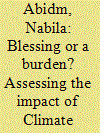

|
|
|
|
|
| Summary/Abstract |
Climate change received substantial attention because of its implications on all spheres of life. This study examined the effects of climate change mitigation on the economic, environmental, and social development of 18 European countries based on the environmental performance index for data from 1981 to 2018; control variables include foreign direct investment, trade openness, renewable and non-renewable energy, population growth and life expectancy. Panel quantile regression result shows that climate change mitigation is ineffective in promoting economic growth in an aggregate manner; only high and moderate environmental performance ranking countries manage to spur economic growth and social development. Low environmental performance rankings countries reveal no impact of climate change mitigation. Climate change mitigation promotes environmental development for all countries. Trade openness and energy choices are crucial to ensure climate change mitigation efforts. Findings indicate that the European Union needs well-designed strict policies that emphasize and help countries increase the share of renewable energy compared to fossil fuels and promote the integration of climate mitigation technology at the national and regional level through lenient tariffs, subsidization, financial aid, and technical assistance that help low economic growth countries accelerate the transition that is required to achieve overall economic, social, and environmental goals.
|
|
|
|
|
|
|
|
|
|
|
|
|
|
|
|
| 5 |
ID:
110892
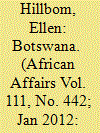

|
|
|
|
|
| Publication |
2012.
|
| Summary/Abstract |
Due to a combination of exceptional economic growth and social development, Botswana has been hailed as an African developmental state. This article rejects the developmental state theory and instead attempts to build an alternative theoretical model. It argues that from the 1930s until the present, Botswana has experienced a state structure characterized by natural resource dependency, lack of economic diversification, a dual society, selective social development and a close connection between the economic and political elite. In the tentative theoretical model presented and discussed here, these are all defining traits of a gate-keeping state. It is hence argued that while Botswana's socio-economic development since independence should in no way be underestimated, it is better understood as the efforts of a development-oriented gate-keeping state rather than a developmental state.
|
|
|
|
|
|
|
|
|
|
|
|
|
|
|
|
| 6 |
ID:
137731
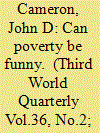

|
|
|
|
|
| Summary/Abstract |
This article examines the use of humour as a strategy to promote increased public engagement in the countries of the global North with issues of global justice. The central argument of the article is that humour can be both an ethical and an effective way of attracting and sustaining public engagement in struggles for global justice. There are risks and limits to the use of humour to represent issues of poverty and injustice but, given low levels of public engagement in these issues in the countries of the global North, humour is a risk worth taking.
|
|
|
|
|
|
|
|
|
|
|
|
|
|
|
|
| 7 |
ID:
078229
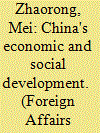

|
|
|
| 8 |
ID:
075793


|
|
|
| 9 |
ID:
073698


|
|
|
| 10 |
ID:
092218
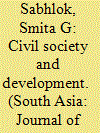

|
|
|
|
|
| Publication |
2009.
|
| Summary/Abstract |
Existing in a social space between the state and the market, civil society can be a site for both fragmentation and solidarity. While most civil society organisations (CSOs) claim to work towards a normative vision of social, economic or cultural development, they do not operate in an organisational vacuum divorced from socio-political reality. They can be representative of different interests and different identities of the people, but they can also play contradictory roles in the development process. The existence of a wide range of civil society organisations can indicate a vibrant democracy; however, if the competing visions of civil society organisations in different domains come into conflict with each other, situations of instability may arise.
|
|
|
|
|
|
|
|
|
|
|
|
|
|
|
|
| 11 |
ID:
029304
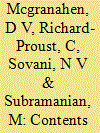

|
|
|
|
|
| Publication |
New York, Praeger Publishers, 1972.
|
| Description |
xiv, 161p.
|
| Series |
Praeger special studies in international economics and development
|
|
|
|
|
|
|
|
|
|
|
|
Copies: C:1/I:0,R:0,Q:0
Circulation
| Accession# | Call# | Current Location | Status | Policy | Location |
| 011351 | 338.9/MCG 011351 | Main | On Shelf | General | |
|
|
|
|
| 12 |
ID:
127306
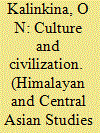

|
|
|
| 13 |
ID:
124944
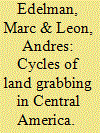

|
|
|
|
|
| Publication |
2013.
|
| Summary/Abstract |
The lack of historical perspective in many studies of land grabbing leads researchers to ignore or underestimate the extent to which pre-existing social relations shape rural spaces in which contemporary land deals occur. Bringing history back in to land grabbing research is essential for understanding antecedents, establishing baselines to measure impacts and restoring the agency of contending agrarian social classes. In Central America each of several cycles of land grabbing-liberal reforms, banana concessions and agrarian counter-reform-has profoundly shaped the period that succeeded it. In the Bajo Aguán region of Honduras-a centre of agrarian reform and then counter-reform-violent conflicts over land have been materially shaped by both peasant, landowner and state repertoires of contention and repression, as well as by peasants' memories of dispossession.
|
|
|
|
|
|
|
|
|
|
|
|
|
|
|
|
| 14 |
ID:
118863
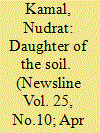

|
|
|
| 15 |
ID:
128225
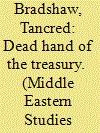

|
|
|
|
|
| Publication |
2014.
|
| Summary/Abstract |
This paper addresses an aspect of British policy in the Trucial States that has received scant scholarly attention. It examines British attempts to promote economic and social development in the Trucial States, and places this policy within the context of British attitudes towards the economic development of the colonial empire. During the 1950s Britain's interest in the Arabian Peninsula expanded, in notable contrast with the rest of the Middle East. One aspect of this expanded role was British efforts to improve the economic and social conditions prior to the discovery of oil in Abu Dhabi in 1958. British officials on the ground were concerned to improve the lot of the population of these impoverished shaikhdoms for a combination of political and strategic and ethical reasons. This article shows that attempts to introduce a modicum of economic and social development in the Trucial States were hindered by the Treasury's refusal to provide adequate funds, and because of inherent problems in finding suitable development projects. Nonetheless, the plans put in place during the 1950s did provide the foundations for subsequent development programmes, which, in turn, drastically expanded as a result of oil wealth.
|
|
|
|
|
|
|
|
|
|
|
|
|
|
|
|
| 16 |
ID:
128094
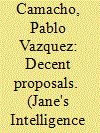

|
|
|
|
|
| Publication |
2012.
|
| Summary/Abstract |
Mexico's problems of violence and drug trafficking by organized crime groups have promoted demands fro change in security policy. Pablo Vazquez Camacho assesses the incoming president's plans for reform and tackling the causes of crime
|
|
|
|
|
|
|
|
|
|
|
|
|
|
|
|
| 17 |
ID:
139540
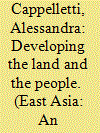

|
|
|
|
|
| Summary/Abstract |
Social development in Xinjiang Uyghur Autonomous Region from 1999 to 2009 is the focus of this article. I will explore the current situation among Uyghurs and Hans living in Xinjiang in different social contexts and purviews, mainly assessing problems and open questions hindering a balanced and consensus-based social development in the area. The concept of “development” per se will be understood with a critical perspective. The fieldwork was conducted in 2011 and 2012 in Urumqi, Turpan, Kahsgar, Wujiaqu and Shihezi, and in eight rural villages—seven located in the Kashgar Prefecture and one in Kizilsu Kyrgyz Autonomous Prefecture. The opportunity to adopt an “insider perspective”, at the same time working with critical tools provided by the disciplines of sociology and anthropology, can be considered an important asset in the field of Xinjiang studies. My PhD research in China (2010–2013) and my work as consultant for KFW (2011–2012) have been of great help in adopting this approach. Interviews, participant observation and analysis of quantitative and qualitative data from different sources are the basis of the fieldwork results presented here. UNDP indicators and indexes are taken as reference in setting and organising data.
|
|
|
|
|
|
|
|
|
|
|
|
|
|
|
|
| 18 |
ID:
161647
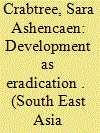

|
|
|
|
|
| Summary/Abstract |
The political rhetoric of social and economic development in Malaysia is used as a dominant and largely unquestioned discourse to justify the industrialized exploitation of the traditional territories of the indigenous people of West Malaysia. This article explores social policy drivers in respect of findings from a condensed ethnography of the Jakun Orang Asli people of Tasik Chini in the State of Pahang. Tasik Chini provides an important example of a wider problem affecting many Orang Asli communities in Malaysia relating to industrial exploitation, but is a case of special interest in respect of its significance as a site of rich and unique biodiversity, as well as being home to one of only two freshwater lakes in West Malaysia. Notably, Tasik Chini is also a UNESCO Biosphere Reserve, of which there are only two in Malaysia. The lake and surrounding forests have provided the Jakun villagers with abundant natural resources for subsistence, but now the area is badly eroded and polluted by the ravages of big business. This presents a serious dilemma for the Jakun concerning whether to resist the destruction of their traditional way of life or to comply with state agendas and collude with their loss of self-sufficiency and autonomy. As such, the situation in Tasik Chini raises important questions regarding national social policy drivers and the position and welfare of indigenous people in Malaysia.
|
|
|
|
|
|
|
|
|
|
|
|
|
|
|
|
| 19 |
ID:
110269
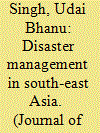

|
|
|
|
|
| Publication |
2012.
|
| Summary/Abstract |
South-east Asia is the epicentre of frequent disasters of varying intensity. The damage to life and property caused by these disasters is comparable to that caused by war. Disasters disrupt the national economy and social development. Besides, the world has shrunk and news about the hardship suffered by the people is rapidly disseminated. As such, the management of disasters has become a key concern of governments confronted with an increasingly aware civil society and a shorter reaction time. Often when disaster strikes, it impacts more than one country and sometimes the region as a whole. The intensity and the frequency of such disasters have prompted the ASEAN to evolve its own response mechanism. However, often the scale of the disaster is so huge that only an international response can meet the challenge. In such cases, the international community, acting through the United Nations and its various agencies and other inter-governmental and non-governmental bodies, has provided succour. Although disasters can be natural, technological and conflictrelated, this paper addresses only natural disasters in the region.
|
|
|
|
|
|
|
|
|
|
|
|
|
|
|
|
| 20 |
ID:
082151


|
|
|
|
|
| Publication |
2008.
|
| Summary/Abstract |
This article examines the images of 98 study participants interviewed during the summer of 2006 and a public opinion survey of 1,023 adults conducted in October 2006 with regards to the role of the European Union (EU) Peace II Fund and the International Fund for Ireland (IFI) in community development, reconciliation, and sustainable peacebuilding. The perceptions of community group leaders, funding agency civil servants, and development officers are explored with regards to the role of both funds in building the peace dividend in Northern Ireland. Further, the article explains the importance of community development and cross-community contact through joint economic, peace and justice, and social development projects.
|
|
|
|
|
|
|
|
|
|
|
|
|
|
|
|
|
|
|
|
|